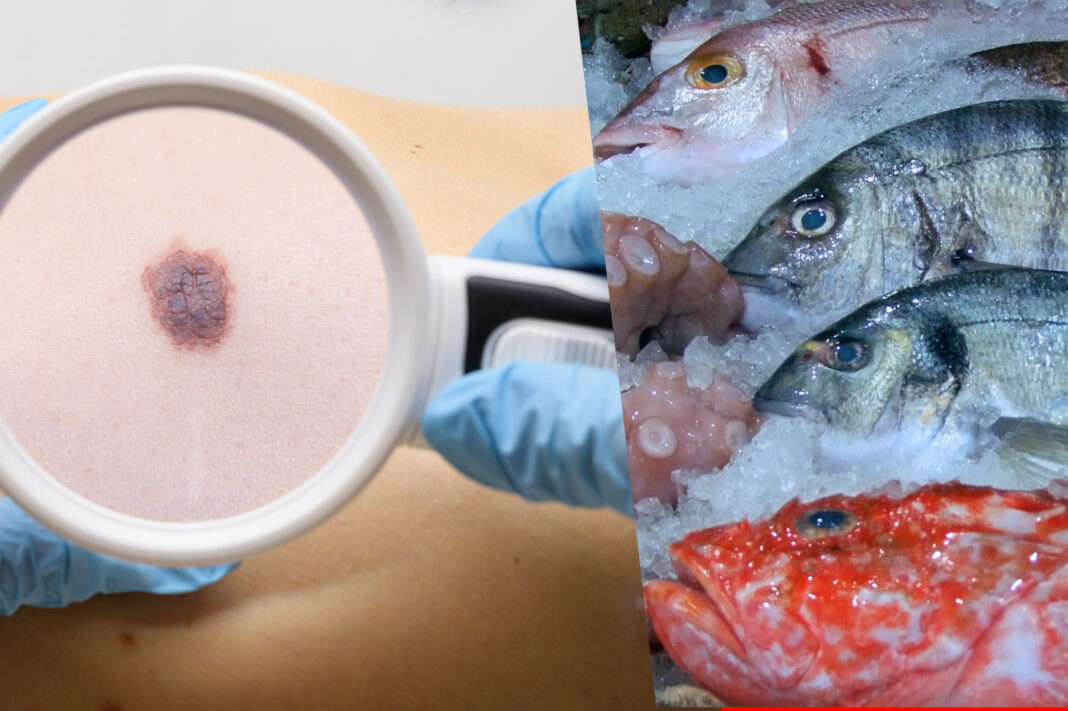Most people associate the consumption of seafood with a healthy lifestyle. It is common knowledge that seafood contains many important nutrients that support our health. As it was in the past, sea creatures are currently contaminated with many dangerous substances. The oceans are saturated with garbage and chemicals that people dump into it. When we consume sea creatures, these dangerous substances enter our body. Are you afraid of melanoma? You probably know that its risk increases with frequent exposure to the sun. According to a new study, the risk of melanoma increases even with regular consumption of seafood.
How did the study go?
A new study from Brown University revealed an increased risk of melanoma. The study was published in the journal Cancer Causes and Control. It has also been found that eating fish may pose a higher risk of developing this serious skin cancer with a high risk of death. Some may be shocked by the results of the study. The study analyzed 491,367 participants in a NIH-AARP Diet and Health Study, with participants recording when, how much, and how often they ate various types of prepared seafood.
Specifically, these foods are: fried fish, non-fried fish or other seafood, and oil- or water-packed tuna. These are the most popular types of seafood. The study takes into account family history (cancer, smoking, physical activity, alcohol intake and others), lifestyle and socio-demographic factors. Scientists used multivariable-adjusted Cox proportional hazards regression to estimate hazard ratios (HRs) and 95% confidence intervals (CIs).

What are the results of the study?
Over a follow-up period of a median of 15.5 years, the researchers found 5,034 cases of malignant melanoma and 3,284 cases of melanoma in situ in the participants. These are truly alarming numbers. About 1% of the total participants developed malignant melanoma, while about 0.7% developed melanoma in situ. It means stage 0 melanoma where the cancer is still isolated to the top layer of the skin and has yet to spread.
“The positive associations were consistent across several demographic and lifestyle factors,” the study stated. “There were also positive associations between tuna intake and non-fried fish intake, and risk of malignant melanoma and melanoma in situ. However, fried fish intake was inversely associated with risk of malignant melanoma, but not melanoma in situ.”

How much fish do you eat a day?
If you like tuna, you probably won’t like that you increase your risk of melanoma by eating it regularly. Participants who ate 0.5 ounces of tuna daily compared to those who ate 0.01 ounces per day had a 17% higher risk of both malignant melanoma and melanoma in situ. Those who ate 0.62 ounces of non-fried fish or seafood daily compared to about 0.01 ounces of non-fried fish or seafood per day had an 18% higher risk of malignant melanoma and a 25% increased risk of melanoma in situ.
What are the fish contaminated with?
“We speculate that our findings could possibly be attributed to contaminants in fish, such as polychlorinated biphenyls, dioxins, arsenic, and mercury,” said Eunyoung Cho, study co-author and associate professor of dermatology and epidemiology at Brown University, as reported by Plant Based News.
“Previous research has found that higher fish intake is associated with higher levels of these contaminants within the body and has identified associations between these contaminants and a higher risk of skin cancer. Mercury consumption in the U.S. is mostly from fish. So if mercury is related to skin cancer, then it stands to reason that fish intake may be related, too.”

To eat or not to eat fish?
It was found that higher total fish intake, tuna intake, and non-fried fish intake were positively associated with risk of both malignant melanoma and melanoma in situ. In order to be able to draw specific conclusions, more studies are needed that will focus on the effect of consuming contaminated fish on our organism. In any case, it is a shame for humanity that the oceans are full of garbage and poisons that we then consume. In short, the fish are no longer as healthy as in the past. If you like fish, do not avoid eating it, but it is advisable to consider whether to eat it regularly or to limit its intake.
Source:
https://link.springer.com/article/10.1007/s10552-022-01588-5
https://www.ecowatch.com/fish-consumption-melanoma.html
https://plantbasednews.org/lifestyle/health-and-fitness/new-study-fish-skin-cancer-melanoma/
Image credit: Photo 175226552 / Melanoma © Aleksandr Malikov | Dreamstime.com, Pixabay.com















